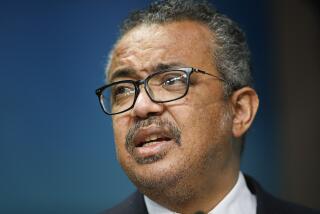U.N. Chief to Push for 2nd Term Despite Veto Threat
- Share via
WASHINGTON — Boutros Boutros-Ghali is determined to fight for a second term as United Nations secretary-general despite the threat of an American veto, and he is heading to Africa in early July to shore up his support, U.N. sources said Friday.
The secretary-general reportedly hopes that a shower of international endorsements will embarrass President Clinton into withdrawing his veto threat.
But State Department spokesman Nicholas Burns told reporters: “Our minds will not be changed.”
The 73-year-old Boutros-Ghali, who began his five-year term in January 1992, after a long career as a law professor and Cabinet member in Egypt, will fly to Cameroon on July 7 for the annual conference of the Organization of African Unity.
African governments make up more than a quarter of the total U.N. membership of 185, and those at the meeting are expected to endorse the secretary-general’s candidacy.
Boutros-Ghali is also counting on public support from France, Russia, a host of other European countries and possibly China.
Moreover, it is understood that he believes that he will be helped by a strong international backlash against what U.N. aides regard as the arrogance of the Clinton administration in threatening to veto a secretary-general while the United States owes well over $1 billion in past dues.
But Republican presidential candidate Bob Dole has been trying to portray Clinton for months as a naive leader who lets Boutros-Ghali set foreign policy objectives for the United States, and a retreat by Clinton could add fuel to Dole’s argument.
Boutros-Ghali cannot win a second term unless the administration withdraws the threat. Although the General Assembly, which is made up of all U.N. members, formally elects a secretary-general, it does so only after the candidate has been proposed by the 15-member Security Council.
Any of the five permanent members--the United States, Russia, Britain, France and China--has the power of veto in this council.
In any case, Boutros-Ghali’s international support may not be as strong as his aides suggest.
Many U.N. diplomats resent his refusal to spend much time with them and his penchant for ignoring them while phoning their foreign ministers directly. Some French and African officials also are troubled by his refusal to reward their countries with many high-ranking jobs, despite the fact that their support enabled him to win his first term.
At the State Department, Burns told reporters that, after discussions with Secretary of State Warren Christopher and U.N. Ambassador Madeleine Albright, Clinton decided in March that Boutros-Ghali would have to go.
In a series of meetings and phone calls, Christopher offered the secretary-general a graceful exit by promising support for a one-year extension of his term if he, in turn, promised to retire, Burns said.
In a telephone conversation Tuesday, however, “Boutros-Ghali informed the secretary that he could not accept our offer of an additional year in office,” Burns said. “At that point, the secretary told him that the offer would be taken off the table.”
According to U.N. officials, the secretary-general and the Clinton administration have disagreed--often in public--on policies covering Bosnia, Somalia, Rwanda, peacekeeping, Burundi, Haiti, Israel and land mines.
Times staff writer Norman Kempster contributed to this report.
More to Read
Sign up for Essential California
The most important California stories and recommendations in your inbox every morning.
You may occasionally receive promotional content from the Los Angeles Times.













